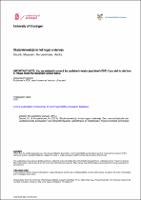Studentenwelzijn in het hoger onderwijs
Een overzichtsstudie van veelbelovende aanpakken voor docenten(teams), opleidingen en instellingen.
Author(s)
Deunk, Marjolein
Korpershoek, Hanke
Collection
Dutch Research Council (NWO)Language
DutchAbstract
Recent Dutch studies show that more than half of students in higher
education experiences emotional and psychological complaints to a greater or lesser extent and that a wide
majority of students indicate that they often or very often experience stress as a result of the study and
experienced pressure to perform. The corona crisis also has a lot of extra stress for many students
taken care of. High stress levels and high pressure and urgency to perform are seen as important
explanations for lower well-being of students in higher education. Students struggle with
stress and fears, and this has consequences for their study success, among other things. student well-being
is defined as a sustained positive mental state in combination with a
absence of psychological complaints and is influenced by factors within and outside the
study. Higher education institutions and courses do not influence all these factors,
but can offer students support through policy and measures. The question is whether
this support is mainly aimed at symptom control, or at prevention and on
culture change towards less emphasis on the nominally studying “model student”. In a
social context in which there is an active pursuit of diversity and inclusion in higher education
education, it is important that students who do not resemble that model student also
feel connected to the training and feel the space to ask for support.
This overview study focuses on the question of what higher education institutions can do
do to promote the mental well-being of students and how and when a
differentiated approach is helpful. The basic premise is that the overview study
produces sound knowledge that is more or less directly applicable for educational practice and policy
in higher education institutions and courses. Recente Nederlandse studies tonen aan dat meer dan de helft van de studenten in het hoger
onderwijs in meer of mindere mate emotionele en psychische klachten ervaart en dat een ruime
meerderheid van de studenten aangeeft vaak of heel vaak stress te ervaren door de studie en
ervaren prestatiedruk. Ook de coronacrisis heeft bij veel studenten voor veel extra stress
gezorgd. Hoge stressniveaus en hoge prestatiedruk en –drang worden gezien als belangrijke
verklaringen voor lager welzijn van studenten in het hoger onderwijs. Studenten kampen met
stress en angsten en dit heeft onder andere gevolgen voor hun studiesucces. Studentenwelzijn
wordt gedefinieerd als een duurzame positieve psychische gesteldheid in combinatie met een
afwezigheid van psychische klachten en wordt beïnvloed door factoren binnen en buiten de
studie. Hoger onderwijsinstellingen en -opleidingen hebben niet op al deze factoren invloed,
maar kunnen studenten door beleid en maatregelen wel ondersteuning bieden. De vraag is of
deze ondersteuning vooral gericht is op symptoombestrijding, of op preventie en op
cultuurverandering naar minder nadruk op de nominaal studerende “modelstudent”. In een
maatschappelijke context waarin actief wordt gestreefd naar diversiteit en inclusie in het hoger
onderwijs, is het van belang dat ook studenten die niet op die modelstudent lijken, zich
verbonden voelen met de opleiding en de ruimte voelen om ondersteuning te vragen.
In deze overzichtsstudie staat de vraag centraal wat hoger onderwijsinstellingen kunnen
doen om het mentaal welzijn van studenten te bevorderen en hoe en wanneer een
gedifferentieerde aanpak daarbij behulpzaam is. Het uitgangspunt is dat de overzichtsstudie
degelijke kennis oplevert die min of meer direct toepasbaar voor onderwijspraktijk en –beleid
in hoger onderwijsinstellingen en -opleidingen.
Keywords
studenten; hoger onderwijs; welzijn; students; well being; higher educationISBN
9789066905825Publisher
Rijksuniversiteit Groningen (RUG)Publisher website
https://www.rug.nl/Publication date and place
Groningen, 2021Classification
Education


 Download
Download